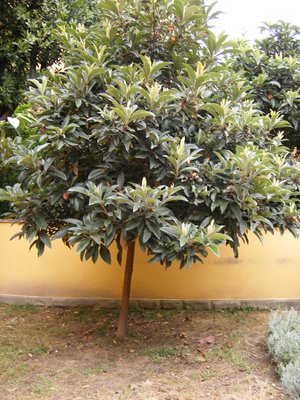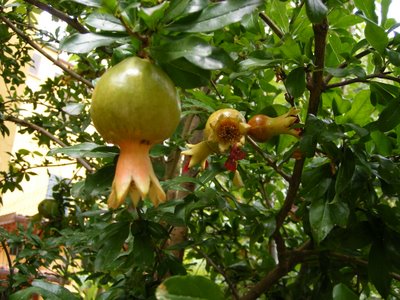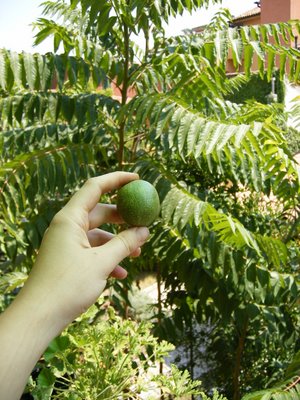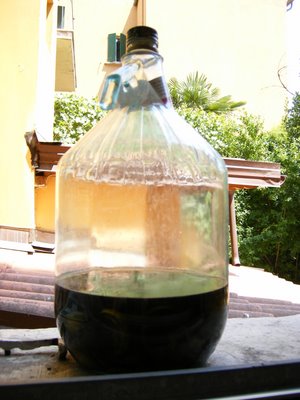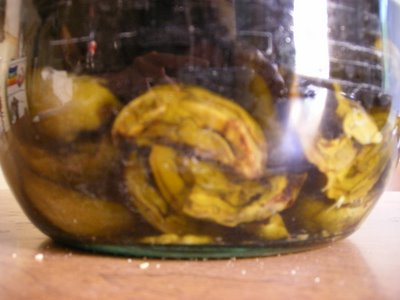Most of the time I don't miss American food. I am, afterall, in the capital of the region that makes Parmesan cheese, prosciutto di Parma, tortellini, balsamic vinegar di Modena, and any number of lesser known specialties like passatelli (thick noodles made with breadcrumbs and cheese), and the great unknown wines of Romagna. I buy great white table wine, a local fruity pignoletto, at 7 euros for a five liter demijohn. I am well fed in Bologna.
I'm sure I've written something of the sort before, but it bears repeating because the local food is so good. However, there are days when I'd kill for a homemade chocolate chip cookie. My imported supply of chips ran out weeks ago, soon after I a first batch to introduce to Italian friends at the Italy-USA world cup match. "SSSSHhhh!!!" C. kept telling me when I presented them as "biscotti americani", "You're going to get us beat up!". But for all the hissing at the US team going on in the crowd, the "biscotti americani" were acknowledged as "the best biscotti I've ever had".
Since I do nearly all my own cooking, I have plenty of opportunity to make my own American food. But sometimes this is a challenge: how do you make a cherry crumble in a place without oatmeal? I've brewed my own vanilla extract for American desserts, and searched for brown sugar everywhere (finally found as 'organic cane sugar' in a supermarket). There are no little summer beets for beet and goat cheese salads, no molasses for my kickass barbecue sauce, no jalepeno peppers to make salsa, no tortillas, no cheddar cheese for cheeseburgers, no corn on the cob, no sugarsnap peas, no maple syrup for the first pancakes my friends ever tasted. Not to mention the tacos al pastor or rice vermicelli with barbecued pork and springrolls or crystal shrimp dumplings or baklava I was accustomed to find near home in New York.
As a result, I've become a master of substitution. Tonight's July 4th meal, overshadowed by the Italy-Germany world cup semifinals, includes barbecued chicken, cucumber salad, and peach cobbler. The cucumber salad and peach cobbler aren't much changed, other than making mint the herbal note instead of the classic dill with my cucumbers in yogurt. But my kickass barbecue sauce, which usually requires a hefty dose of bourbon, a couple star anise, and molasses has become a grappa, fennel seed, chestnut honey and hefty dose of espresso glaze. Necessity of the mother of invention: it still kicks ass.
Ingredients:
1 large onion
2 big cloves garlic
2 leftover demitasses of espresso (M's study group this afternoon forgot they made coffee)
ketchup
cayenne pepper
nutmeg
cumin
black pepper
fennel seeds
chestnut honey
grappa
salt
I can't provide real quantities of most ingredients, since barbecue sauce-making is a taste-and-adjust art form. Very very slowly carmelize the onions and garlic, both finely minced. Add the spices and allow to become fragrant, about 10 seconds, then dump in espresso and honey. Start sqeezing in ketchup soon after, then a few glugs of grappa. Depending on the ketchup and the honey (ketchup varies widely in amounts of sugar and vinegar, while honey always does its own thing, depending on the region, the bees, etc) you'll want to adjust sweetness and sourness to taste. And salt.
Basically a tomato-based barbecue sauce is always a soffrito base (onions) plus sweet(brown sugar, honey, molasses, fruit, marmelade, or something weird like soft drinks), plus sour - partially from tomato product (paste, chopped, sauce, or ketchup) plus additions (usually vinegar, though I've used rhubarb or tamarind with excellent results), plus salty (salt, soy sauce, worchester), plus additional levels to the flavor profile: spices, whiskey or beer or grappa!, cayenne, etc. Any cook should have their own barbecue favorite.
Being a North Carolinian, I favor vinegary sauces, even if I'm making a non-Carolina tomato barbecue sauce. I'm holding out for a whole pig and the day I can convince M. to dig a fire pit for a real Carolina bbq. Hushpuppies and slaw and banana pudding and all...
Happy 4th of July from a self-exile.
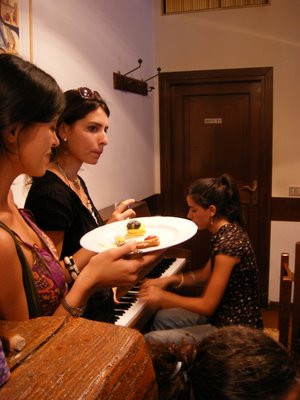
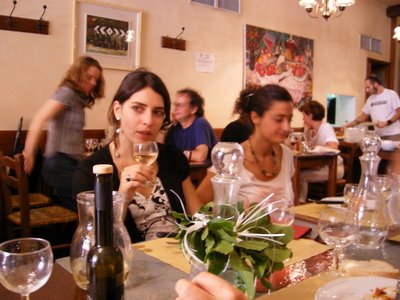
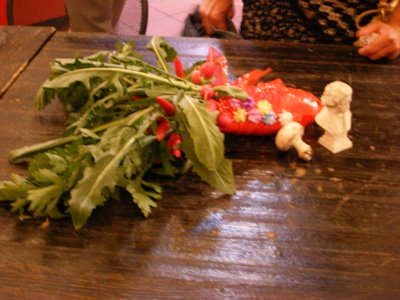 new dottoresse: M and G, sorellina J plays piano
new dottoresse: M and G, sorellina J plays piano



